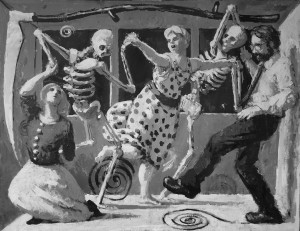November is Beat Bullying Month. This blog post was contributed by Dr Andreas Liefooghe, a Reader in Birkbeck’s Department of Organizational Psychology.
From minor family squabbles to nations at war, conflict is a universal fact of life, and one of its most potent features is the bully. Last month, the CIPD journal People Management ran with the headline “Are you a bully?”, and offered a Cosmo-style quiz to ascertain what kind of bully you might be (there are, apparently, four types). Glib answers for difficult questions have clearly lost none of their appeal.
As David Cameron condemns Unite’s tactics at Grangemouth as “bullying” (they took a life-size rat to a leafy suburb to protest at the house of a director of Ineos, the Grangemouth operator), Unite’s general secretary Len McCluskey dismisses “Bullingdon Bully Cameron” as whipping up media hysteria and using bullying allegations to deflect attention from the reality of closing down factories. This is a long way away from kids stealing dinner money, or your boss undermining your confidence. Are we still talking about the same phenomenon?
To raise awareness of bullying, subtlety had to fall by the wayside – simple messages were important, and it clearly worked. Awareness around bullying, both in schools and at work, has increased considerably over the past two decades. This week sees the launch of anti-bullying month for schools. On the 7 November it is National Ban Bullying at Work day. Awareness, yes. But understanding?
National Ban Bullying at Work Day is held annually in memory of Andrea Adams and Tim Field, two pioneers who devoted their lives to eradicating bullying. Not so often mentioned is Adams’ co-author, Tavistock psychotherapist Neil Crawford, who also died a decade ago. Crawford brought the subtleties of psychoanalytic thinking to the bullying at work field. “I feel I was robbed … my confidence disappeared”, states a victim of bullying I talked to recently. Stealing is at the core of bullying. Envy, Crawford argues, involves identifying with the goodness of others and stealing it. Bullies are insecure, and feed off others, sucking the life out of them.
Being robbed, feeling bereft, death. Dr Sheila White, who continues and reshapes psychoanalytic thinking in the field, gives us the notion of the dance of death to understand workplace bullying. She describes it as a perverse and pernicious form of projective identification, occurring around organizational vacuums and structural fractures. Individuals, seeking recognition, get trapped in ‘a dance of death’. Adult bullies do not have secure feelings about who they are, and through envy and the quest for recognition, hook into others and won’t let go. Her book gives in-depth insights into the core issues of workplace bullying from the perspectives of the individuals involved, their interpersonal relationships, the group dynamics and – crucially – their organizational contexts.
Bullying will only occur if the organizational context is suitable for bullying. “Just as plants only grow if the conditions of the soil, temperature, light levels etc are favourable, so bullying will only occur if an organizational context fosters a bully’s need to bully”, argues White. So what are these unsuitable organizational contexts? White describes organizations that have vacuums where there is no support for individuals or groups. She also highlights structural fractures, where job descriptions are unclear and communication is poor or inconsistent; expectations of performance are unrealistic and there is an over-identification with targets/quotas. Often, management are unaware of how negative projections filter down the organization, generating the potential for dysfunctional behaviour along the way.
Workplace bullying is costly: increasingly petty conflicts are being registered as formal complaints and, in no time, legalities take over and costs spiral out of control. Preventive actions and interventions need to be based on a sound knowledge of the deeper issues which foster bullying scenarios. White’s book makes a major contribution to this understanding, and is an essential read.
Dr Sheila White’s book is launched at Birkbeck on 21 November.Booking is essential.


